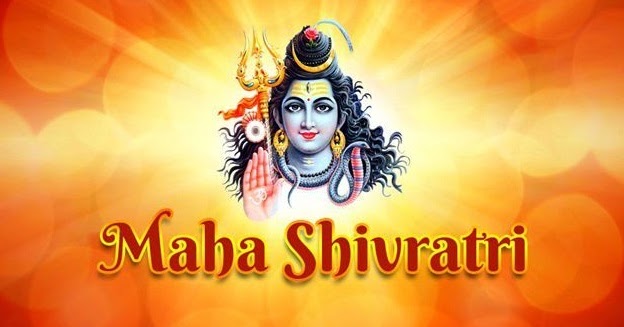
Photo : mahashivaratri2019wishes.blogspot.com
Maha Shivratri , a great night for the greatest God. It is a Hindu festival celebrated in the honor of God Shiva. According to Hindu calendar, there is a Shivratri in every luni-solar month but Maha Shivratri comes only once in a year which is in late winter (Magha) and before the arrival of summer, which gives it a great importance for the Hindus. Maha Shivratri means “the great night of Shiva”. It is celebrated as a major festival in Hinduism, this festival marks a remembrance of “overcoming darkness and ignorance” in life and the world. It is observed in India, Nepal and many other parts of the world by chanting prayers, fasting for the whole day, doing Yoga and meditating on ethics and virtues such as honesty, non-injury to others, forgiveness, and the discovery of Shiva. During this festival the ardent devotees keep awake all night and others visit one of the Shiva temples or go on pilgrimage to joytirlingams. Maha Shivrtari is regarded as an ancient Hindu festival whose origin date is unknown. Celebration of Maha Shivratri includes maintaining a jaagaran, an all night vigil and prayers, because Shaiva Hindus mark this night as “overcoming darkness and ignorance” in one’s life and the world through Shiva. Offerings of fruits, apple wood leafs, sweets and milk to Shiva are made and ‘Om Namah Shivaya’, the scared mantra of Shiva, is chanted throughout the day in the temples.
Maha Shivratri is mentioned in several Puranas. According to history, Maha Shivratri was the day when Shiva drank a pot of poison which was emerged during the samudra manthan. The poison was so dangerous that it was capable of destroying the entire world so to save the world Shiva drank the poison but did not swallow it and held it in his throat and from that he was also known as Neelakantha. Maha Shivratri is mentioned in various Puranas, different legends describe the significance of Maha Shivratri. According to one legend in the Shaivism tradition, this is the night when Lord Shiva performs the heavenly dance of creation, presentation and destruction. The chanting of Hymns, reading of the scriptures and the chorus of devotees join the cosmic dance and remembers the presence of Shiva everywhere.
Another legend has it that after the Earth was faced with an imminent destruction, Goddess Parvati pledged with Lord Shiva to save the world. Lord Shiva was pleased with her prayers and agreed to save the world on the pretext that the people of the Earth would have to worship him with dedication and passion. From that day onwards, the night when Lord Shiva saved the world came to be known as Maha Shivratri and people began to worship Shiva with great enthusiasm. Some folklore also considers this to be the answer given by Lord Shiva when Goddess Parvati asked Lord Shiva about his favourite day.
The significance of dance tradition in this festival has historical roots. Maha Shivratri also has a historic confluence of artists for annual dance festivals at major temples such as Konark, Khajuraho and Chidambaram temples. In 1864, Alexander Cunningham documented the fair and dance festival which is organized at Khajuraho Shiva temples. The Mandi fair in the town of Mandi is also a famous venue for Maha Shivratri. Mandi is located on the banks of Beas and is probably known as the “Cathedral of Temples”. Maha Shivratri is the most important festival in Kashmiri Shaivism, it is celebrated as the marriage anniversary of Shiva and Parvati. In Punjab, it is celebrated as a grand festival by organizing Shobha Yatras which are organized by various Hindu organizations in different cities. In West Bengal, Maha Shivratri is observed devoutly and unmarried girls take a fast on this day seeking a suitable husband.
Maha Shivratri and meditation have a deep connection. According to Indian astrology, there are certain days that are conducive for spiritual growth and meditation and Maha Shivratri is one such day in a year. Spiritual seekers and devotees of Lord Shiva meditate and rejoice in the Shiva energy during Maha Shivratri and the mediator transcends time, space and causation. Thus, we conclude that Maha Shivratri is not only a ritual but also a cosmic definition of the Hindu Universe. It dispels ignorance, emanates the light of knowledge, makes us aware of the Universe, ushers in the spring after the cold and dry winter winds and invokes the supreme power to take cognizance of the beings that we are created by him.
Write and Win: Participate in Creative writing Contest & International Essay Contest and win fabulous prizes.

Author Bio : ADITYA SINGH, 1st Year Science Student from Karimganj. A participant of International Essay Competition , October, 2018.


